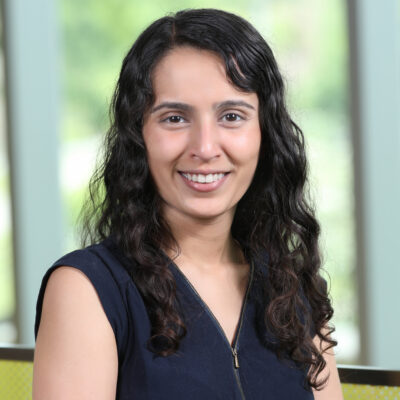Mann Award Winner Investigates Replication Stress

June 20, 2023
By Merry Buckley and Katya Hrichak
When a cell divides, faithfully replicating its DNA is essential – the life of the cell is on the line. This year’s recipient of the 2023 Harry and Samuel Mann Outstanding Graduate Student Award, Jumana Badar, is carrying out research to determine how cells ensure DNA is replicated correctly, a question that is central to how healthy cells reproduce and how drugs that make this process more difficult for the cell could be optimized to target cancer cells.
“I am honored and humbled to be chosen as this year’s recipient,” she said. “This award will enable me to seek out opportunities to gain new skills and exercise the ones I already have.”
When cells replicate, the DNA strands must separate from one another to form what is called a “replication fork” to allow each strand to be copied. A fifth-year Ph.D. candidate in the lab of Marcus Smolka, Badar uses mass spectrometry-based proteomics in combination with genetics and functional assays to understand how cells sense and respond to processes that interfere with DNA replication and result in “stressed” forks.
Replication stress is an important factor in cancer treatment. Because cancer cells replicate very quickly, many chemotherapy drugs create replicative stress so that these cells cannot replicate their DNA faithfully, and Badar hopes to build upon their use.
“Through my work, I hope to identify and target novel proteins in the replication stress tolerance pathway and open the doors for new and improved anti-cancer drugs,” she said.
In Smolka’s lab, Badar has developed skills in genetic manipulation of human cells, biochemistry, cell biology, molecular biology, and mass spectrometry-based proteomics.
“The combination of Jumana’s expertise is unique and puts her in an excellent position to uncover novel, interesting biology in the field of genome replication and maintenance,” Smolka said.
The Mann Award provides $20,000 to an advanced doctoral student in the field of biochemistry, molecular and cell biology who has made substantial progress on their dissertation research and possesses excellent scientific and personal communication skills which enable the ability to present research to both specialist and non-specialist audiences.
“Jumana’s selection is an excellent example of what the Mann Award seeks to foster—excellence in scientific research, collaboration with other scientists, participation, and leadership outside of the laboratory,” said Thomas Mann ’64, trustee emeritus and son of Samuel Mann. “We thank her and wish her all the success possible.”
